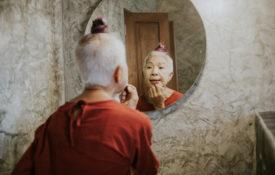-

Chronic Pain Treatment Should Include Psychological Interventions
The latest PSPI examines psychological interventions for the treatment of chronic pain, including the gap between the evidence of the effectiveness of several psychological interventions and their availability and use in treatment.
-
Why Covid Has Broken Parents’ Sense of Risk
There was a brief, shining moment in early summer when the decisions around Covid and my family felt manageable. My husband and I were vaccinated and had returned to some of our favorite indoor activities, like stand-up comedy shows and the gym. Our kids were at a mostly outdoor day camp with procedures we trusted, and the local case rate was low. But as July bled into August, and the threat of the Delta variant increased and news about breakthrough infections emerged, my understanding of the risk of a given activity for any of us — but especially my 8- and 5-year-olds, who are too young to be vaccinated — went completely haywire.
-
Daniel Kahneman: How Companies Can Improve Their Hiring Process
As a young lieutenant, Daniel Kahneman was asked to improve the Israeli army’s haphazard process of assessing capabilities among combat-eligible recruits. Armed with a psychology degree and infantry experience, he brashly made up some criteria, developed questions to elicit relevant facts, and insisted interviewers ask only what he specified. Each recruit would be given a score on each criterion, and the overall “Kahneman score” would be used in deciding how demanding a role was suitable. His structured system worked. In the decades ahead, he reports, the army determined that the system really did result in better assignments.
-

Reminders of Years Left, Not Lived, Motivate Older People
For successful messaging to older adults, ditch the stereotypes, consider their future time horizons, and help them savor the moments they can enjoy.
-
How Our Friends Affect Our Food
In 2013, Jon Stewart, then the host of The Daily Show, set aside the program’s usual focus on politics to talk about something more important: pizza, specifically Chicago-style deep-dish pizza. “Deep-dish pizza is not only not better than New York pizza,” Stewart explained. “It’s not pizza.” Then, after several more minutes railing against the dish, he concluded, “Here’s how I know I’m right: You call it ‘Chicago-style pizza,’ ‘deep-dish pizza,’ ‘stuffed pizza.’” The New York City–born comedian pulled a thin slice of pizza from under his desk. “You know what we call this? Pizza.” Taste is an interesting thing.
-
The Real Reason You and Your Neighbor Make Different Covid-19 Risk Decisions
Some people are comfortable going to concerts and clubs now. Others draw the line at indoor dining. And some are avoiding nearly all gatherings. People’s assessment of what is safe has varied wildly during the Covid-19 pandemic—often leaving us baffled about why our risk decisions differ so sharply from those of our neighbors, friends and family members. Now, scientists are starting to better understand why. Recent research shows that, while politics and geography play a role, other factors are often more important in determining how we make decisions about Covid-19 risks.

